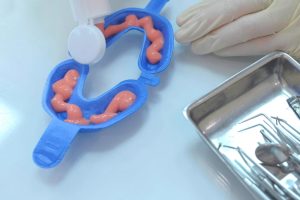Fluoride Treatment for Optimal Oral Health

Learn more about fluoride treatments by giving Dr. Wilson a call at (618) 236-0501.
What Are Fluoride Treatments?
Fluoride treatments include applying fluoride to your teeth to strengthen the enamel, which is the hard outer layer of your teeth. Fluoride is a naturally occurring mineral that can be found in water, food, and soil. It’s added to toothpaste, mouthwash, and drinking water to help prevent tooth decay. It usually takes just a few minutes to apply, and you can resume normal activities immediately afterward.
Two Types of Fluoride
Topical Fluoride
Topical fluoride strengthens your teeth once they’ve erupted from your gums. This type of fluoride reinforces your enamel, making it more resistant to decay. Topical fluoride is available in toothpaste, mouth rinses, and gels.
We recommend that children have a professional application of fluoride twice a year during their regular dental checkups.
Systemic Fluoride
Systemic fluoride strengthens both the teeth that have erupted as well as those still developing beneath the gums. This type of fluoride is available in many community water supplies.
You can also buy fluoride drops for infants and fluoride tablets for children to use throughout their teen years. Fluoride is an invaluable resource for protecting patients against tooth decay.
Benefits of Fluoride Treatments
There are several benefits to fluoride Treatments, including:
- Prevents Tooth Decay: Fluoride can prevent tooth decay by strengthening the tooth enamel and making it more resistant to acid attacks from bacteria in the mouth.
- Reduces Sensitivity: It can reduce tooth sensitivity by strengthening the enamel and blocking exposed dentin tubules.
- Helps Remineralize Teeth: Fluoride treatments can also remineralize teeth that have been damaged by acid attacks, which can help reverse the early stages of tooth decay.
When Are Fluoride Treatments Necessary?
Dentists usually recommend fluoride treatments for individuals who are at a higher risk of developing tooth decay, including:
- Children and teenagers: They’re more prone to tooth decay because their teeth are still developing and aren’t as strong as adult teeth.
- Individuals with dry mouth: Dry mouth can increase the risk of tooth decay as saliva helps neutralize the acid in the mouth.
- Individuals with a history of cavities: Individuals who have had cavities in the past are more likely to develop them in the future.
- Individuals with braces or other orthodontic appliances: Braces and other orthodontic appliances can make it more difficult to clean teeth properly, increasing the risk of tooth decay.
Fluoride Treatment Process

Preparing for the Treatment
Before the fluoride treatment, it’s essential to floss and brush your teeth to remove any food debris or plaque buildup. This step ensures a clean surface for the fluoride to adhere to, maximizing the treatment’s effectiveness. It’s also advised to abstain from eating or drinking for at least 30 minutes before the treatment to ensure the fluoride can effectively adhere to the teeth.
As with any dental procedure, communication with your Swansea dentist is key. Discuss any concerns or questions you may have about the treatment and follow your dentist’s recommendations to ensure a successful fluoride treatment experience.
During the Treatment
During the treatment, a fluoride varnish, foam, or gel is applied to your teeth. The process typically takes less than five minutes, but the benefits can be long-lasting, providing a protective shield against tooth decay and cavities.
Post-Treatment Care
Following the treatment, it’s essential to wait at least 30 minutes before eating or drinking anything to allow the fluoride varnishes to effectively adhere to the teeth. For fluoride varnish applications, it’s recommended to postpone brushing or flossing until bedtime. Additionally, soft foods should be consumed for a minimum of 4 hours after the treatment, and hot drinks or alcohol should be avoided for the same duration.
Frequently Asked Questions
Yes, fluoride treatment is safe for children. It’s often recommended for children and teenagers because their teeth are still developing and usually have a higher risk of cavities.
Yes, having too much fluoride can cause a condition called fluorosis. Fluorosis can cause white spots or brown stains on the teeth. However, fluoride treatment is safe when used in the recommended amounts and can improve your oral health.
Fluoride treatment is usually done in a dental office. However, there are some over-the-counter products, such as fluoridated toothpaste, fluoride supplements, and mouthwash that can help strengthen tooth enamel.
Typically, professional fluoride treatments are done at your regular dental cleanings. However, the frequency of fluoride treatment depends on your individual needs and risk factors for tooth decay. Your dentist will recommend how often you should get fluoride treatment.
Protect Your Tooth Enamel at Corner Stone Dental
From strengthening tooth enamel and preventing tooth decay to remineralizing teeth and reducing acid caused by bacteria, fluoride is an essential mineral for preserving a healthy, confident smile.
By understanding the fluoride treatment process, balancing fluoride intake, and prioritizing regular dental visits, you can take a proactive approach to your dental health and ensure a lifetime of strong teeth and beautiful smiles.
Schedule an appointment with your Swansea,IL dentist to experience fluoride treatments and take the first step toward a brighter, healthier smile today!
